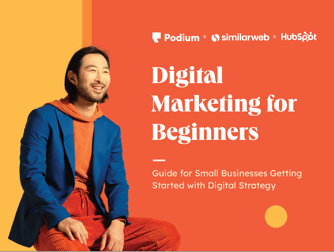-

Inside the B2B Marketing Funnel — Everything I Know as a Marketer
Stop losing leads in the void — here’s how to build your B2B marketing funnel and turn awa...
Alex Sventeckis
2/25/25
-

CPG Design: A Look at Viral Trends + Real-World Examples & Strategies
What role does CPG design play in consumer packaged goods? We chatted with Gander, the des...
Cyan Zhong
2/25/25
-

TikTok Strategy for Brands: Expert Tips
Creating a TikTok strategy for your brand doesn't have to be daunting. Here are some strat...
Erin Rodrigue
2/25/25
-

Consultant behind Meow Wolf, Blue Man Group shares lessons on joy, playing, and ...
An consultant for Meow Wolf, Blue Man Group, Cirque du Soleil & more shares his top tips o...
Curt del Principe
2/24/25
From HubSpot's video library
-
.jpg?height=240&name=YT-237_A%20(1).jpg)
How to Start Affiliate Marketing With No Experience or Money (4 Free Tools!)
-

How Airlines Really Make Money | Hustlenomics | The Hustle
-
.jpg?height=240&name=IMG_0735%20(1).jpg)
What Entrepreneurs Can Learn From Native Deodorant
-

Meet the Designer Behind the Iconic Nudie Suit | Unknown Empires
-

Tips For Elevating Your Next Go-To-Market Strategy (+ Free Templates)
-

Why T-Mobile Trademarked This Color | The Hustle
-
.jpg?height=240&name=YT-237_A%20(1).jpg)
How to Start Affiliate Marketing With No Experience or Money (4 Free Tools!)
-

How Airlines Really Make Money | Hustlenomics | The Hustle
-
.jpg?height=240&name=IMG_0735%20(1).jpg)
What Entrepreneurs Can Learn From Native Deodorant
-

Meet the Designer Behind the Iconic Nudie Suit | Unknown Empires
-

Tips For Elevating Your Next Go-To-Market Strategy (+ Free Templates)
-

Why T-Mobile Trademarked This Color | The Hustle
-
.jpg?height=240&name=YT-237_A%20(1).jpg)
How to Start Affiliate Marketing With No Experience or Money (4 Free Tools!)
-

How Airlines Really Make Money | Hustlenomics | The Hustle
-
.jpg?height=240&name=IMG_0735%20(1).jpg)
What Entrepreneurs Can Learn From Native Deodorant
-

Meet the Designer Behind the Iconic Nudie Suit | Unknown Empires
-

Tips For Elevating Your Next Go-To-Market Strategy (+ Free Templates)
-

Why T-Mobile Trademarked This Color | The Hustle
-

AI Intent — Figuring Out the Purpose that Drives Service Tech
AI intent is an AI system’s ability to understand the meaning behind a user’s input. Disco...
Kolawole Samuel Adebayo
2/21/25
-

Level Up Your POS Experience — Here's What Experts Have to Say
The POS experience is an important transactional moment for your customers. Here's why — a...
Nakul Kadaba
2/21/25
-

Training AI Chatbots — The Guide for Service Teams
Uncover the insights that will help you train AI chatbots effectively, ensuring they deliv...
Kolawole Samuel Adebayo
2/19/25
-

Top 12 Free Help Desk Software & Ticketing Systems in 2025
If you're ready to take customer experience to the next level, you'll need help desk and t...
Rami El-Abidin
2/18/25

An Introduction to Digital Marketing
Learn the basics of digital marketing and explore different ways to reach your ideal customer.
-

When is the Best Time to Start a Business? What Research & Experts Say
Thinking about starting a business? Stop waiting for “perfect” — learn when (and how) to d...
Zoe Ashbridge
2/25/25
-

How to Generate More B2B Leads for Your Sales Team — Plus Expert Tips and New Da...
More leads, less stress — here’s how top sales teams are filling their pipelines.
Meg Prater (she/her)
2/25/25
-

Sales Canvassing: Hard Work That Pays Off Big
From ‘no’ to a thriving pipeline—learn the art of sales canvassing and how to create meani...
Flori Needle
2/25/25
-

6 Common Objection Handling Mistakes You Need to Avoid, According to Experts
Pushback is natural and often productive in a sales engagement, but objection handling is ...
Jay Fuchs
2/24/25
From the HubSpot Podcast Network
-
Business Made Simple

Your Website Probably Stinks—Here’s How to Fix It!
-
The Science of Scaling

How to Scale a Billion Dollar Sales Team w/ John McMahon (Board Member, Snowflake)
-
Truth, Lies and Workplace Culture
-2.png?height=240&name=PodcastCovers23%20(1)-2.png)
From Bystander to Ally: How to Avoid DEIB Washing
-
Imperfect Action
-2.png?height=240&name=PodcastCovers23%20(4)-2.png)
The art of the post-launch review: 5 questions to make your next launch a success
-
Latinx In Power
.png?height=240&name=PodcastCovers23%20(6).png)
Harnessing the Power of Silence in Negotiation with Diana Kleps
-
The Sales Evangelist

5 Ways To Do Daily Outbound With LinkedIn
-
Business Made Simple

Your Website Probably Stinks—Here’s How to Fix It!
-
The Science of Scaling

How to Scale a Billion Dollar Sales Team w/ John McMahon (Board Member, Snowflake)
-
Truth, Lies and Workplace Culture
-2.png?height=240&name=PodcastCovers23%20(1)-2.png)
From Bystander to Ally: How to Avoid DEIB Washing
-
Imperfect Action
-2.png?height=240&name=PodcastCovers23%20(4)-2.png)
The art of the post-launch review: 5 questions to make your next launch a success
-
Latinx In Power
.png?height=240&name=PodcastCovers23%20(6).png)
Harnessing the Power of Silence in Negotiation with Diana Kleps
-
The Sales Evangelist

5 Ways To Do Daily Outbound With LinkedIn
-
Business Made Simple

Your Website Probably Stinks—Here’s How to Fix It!
-
The Science of Scaling

How to Scale a Billion Dollar Sales Team w/ John McMahon (Board Member, Snowflake)
-
Truth, Lies and Workplace Culture
-2.png?height=240&name=PodcastCovers23%20(1)-2.png)
From Bystander to Ally: How to Avoid DEIB Washing
-
Imperfect Action
-2.png?height=240&name=PodcastCovers23%20(4)-2.png)
The art of the post-launch review: 5 questions to make your next launch a success
-
Latinx In Power
.png?height=240&name=PodcastCovers23%20(6).png)
Harnessing the Power of Silence in Negotiation with Diana Kleps
-
The Sales Evangelist

5 Ways To Do Daily Outbound With LinkedIn
-

Membership Website Ideas That Can Build You A Loyal Following
Discover creative ideas and practical tips for launching a successful membership website t...
Stephanie Trovato
2/25/25
-

AI Web Analytics: How Automating Your Analytics Process Can Level Up Your Site i...
Discover how AI web analytics can transform website data into actionable insights, making ...
Lauren Dean
2/25/25
-

How Much Does a Website Cost? Here’s What I Found Out…
Learn about the costs of building a website and discover tips to create an affordable, hig...
Stephanie Trovato
2/24/25
-

Sustainable Website Design: 9 Real Examples + Expert Insights
Explore the best sustainable website design examples and hear from experts on how to make ...
Amy Rigby
2/24/25
-

20 Website Content Ideas Recommended by Experts [With Examples]
Get inspired by these fresh website content ideas from expert content marketers. Explore e...
Amy Rigby
2/24/25
-

How to Start a Web Design Business: 15 Steps to Help You Get Started [+Expert Ti...
Learn essential steps and expert tips for starting a successful web design business, from ...
Osama Zahid
2/24/25
Explore more topics
Ready to brush up on something new? We've got more to read right this way.






.png)
